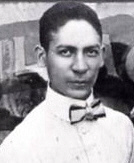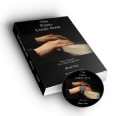Early Jazz Pianists:
Scott Joplin and Jelly Roll Morton
Though not really regarded as one of the early jazz pianists, Scott Joplin is the king of Ragtime, the forerunner of jazz. Jelly Roll Morton claims to have "invented" jazz in 1902, when he was just 12 years old! There is evidence to dispute this, there is no disputing that he was a pioneer early jazz pianist.
Scott Joplin, 1867-1917
Scott was born in Texas and later received a classical piano education from a German teacher. By the late 1880's he had left home with his brothers, traveling the midwest, performing as a vocal group.
He later attended college in Sedalia, Missouri, where he studied music. In Sedalia he played piano at a social club named "The Maple Leaf." In 1899 he composed and published "The Maple Leaf Rag," which was the first instrumental sheet music to sell over a million copies. He earned one cent for each copy sold! With that success, he moved to St. Louis, and continued composing, including hits like "The Entertainer."
Sometime along the way he had contracted syphilis, which affected his ability to play piano. He later died from complications of the disease.
Ferdinand "Jelly Roll" Morton, 1890-1941

Even if "Jelly Roll" hadn't invented jazz, he was surely the first serious jazz composer, and the most influential of the early jazz pianists.
By the age of fourteen, he was considered one of the best pianists in Storyville. At the time he was living with his grandmother, and telling her he was working in a barrel factory. In reality, he was playing in a brothel. When she found out, she threw him out, at which time he began touring the south in minstrel shows. During this period he wrote "Jelly Roll Blues" and "King Porter Stomp." By 1915 he managed to get "Jelly Roll Blues" published. It is widely regarded as the first jazz song to be published.
By the early twenties, he had performed in Chicago and New York, where James P. Johnson and Willie "The Lion" Smith both heard him play. In 1923 he moved back to Chicago where he made recordings and piano rolls. He later made a deal with Victor, the largest record company at the time. He recorded sides under the name of "Jelly Roll Morton and His Red Hot Peppers." Some members of his band included other musicians from New Orleans and originators of jazz, including Kid Ory, Barney Bigard, and Johnny and Baby Dodds.
He later moved to New York and recorded with other musicians, but didn't get the same sound. With the Depression and low record sales, he was released from his contract.
By 1935, Jelly Roll had made it to Washington D.C., where he got a job in a nightclub. He not only played piano, but was also the bouncer, bartender, manager and M.C. One night he was stabbed in the chest during an altercation. He was brought to a white hospital, where the staff took their time taking care of him. As a result, his wounds never healed right, and years later he died from resulting complications.
Jelly Roll's legacy includes "Wolverine Blues," "Black Bottom Stomp" and "I Thought I Heard Buddy Bolden Say," securing his place as one of the greatest early jazz pianists.
Start Playing Piano Today with the Piano Guide Quick Start Course!
Easy to follow step-by-step lessons designed for adult beginners. The next best thing to private lessons!
What You'll Learn:
- Notes on the piano/keyboard
- Proper fingering
- C major scale
- Chords
- How to read music
- And much more!

Video lessons - watch as I play everything for you.

